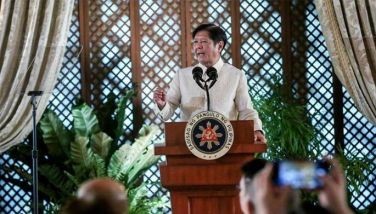APEC countries need to invest $4.4T in energy sector till 2020
June 12, 2004 | 12:00am
The Asia Pacific region needs between $3.4 trillion to $4.4 trillion worth of energy investments from 2000 to 2020, an international energy expert said.
In a presentation during the 6th APEC Energy Ministers Meeting, Masaharu Fujitomi, president of the Asia-Pacific Energy Research Center (APERC), said these investments, as a share of the gross domestic product (GDP), will be largest for developing economies including the Philippines.
The bulk of the much-needed investment will be channeled to the electricity generation and transmission sector at 49 percent, and oil and gas production, processing and petrochemical at 23 percent.
Other investments are needed for oil and gas pipeline projects (16 percent); oil and gas international trade (nine percent) and coal and delivery costs (three percent).
He said in the next two decades, electricity demand will grow fastest in Southeast Asia (6.1 percent per annum), Latin America (5.7 percent) and China (5.6 percent).
However, Fujitomi noted that there are existing hurdles in sourcing for financing energy projects in the region.
He said since the Asian financial crisis in 1997, there was a noted decline in the flow of financial resources while large-scale projects also became difficult to carry out.
According to the APERC official, the creation of efficient financial market would help mobilize available capital to the needed area.
Regulatory uncertainty, he said, also serves as one of the hurdles in attracting energy investment in developed APEC economies.
He said so far, energy efficiency and renewable energy projects are still hard to finance commercially.
Aside from robust energy demand growth and large-scale investment requirements, other challenges for enhancing the energy security in APEC are the rising energy prices amidst greater oil import dependency.
He noted that oil import dependency will reach 55 percent in 2020 from 36 percent at present.
APERC, he said, have been trying to help address these challenges through efficient data and information dissemination among member-economies on the demand and supply outlook, oil supply security, energy market reform, energy infrastructure, energy efficiency, among others.
APEC, or the Asia-Pacific Economic Cooperation, comprises Australia, Brunei, Canada, Chile, China, Hong Kong, Indonesia, Japan, South Korea, Malaysia, Mexico, New Zealand, Papua New Guinea, Peru, the Philippines, Russia, Singapore, Taiwan, Thailand, the United States and Vietnam.
In a presentation during the 6th APEC Energy Ministers Meeting, Masaharu Fujitomi, president of the Asia-Pacific Energy Research Center (APERC), said these investments, as a share of the gross domestic product (GDP), will be largest for developing economies including the Philippines.
The bulk of the much-needed investment will be channeled to the electricity generation and transmission sector at 49 percent, and oil and gas production, processing and petrochemical at 23 percent.
Other investments are needed for oil and gas pipeline projects (16 percent); oil and gas international trade (nine percent) and coal and delivery costs (three percent).
He said in the next two decades, electricity demand will grow fastest in Southeast Asia (6.1 percent per annum), Latin America (5.7 percent) and China (5.6 percent).
However, Fujitomi noted that there are existing hurdles in sourcing for financing energy projects in the region.
He said since the Asian financial crisis in 1997, there was a noted decline in the flow of financial resources while large-scale projects also became difficult to carry out.
According to the APERC official, the creation of efficient financial market would help mobilize available capital to the needed area.
Regulatory uncertainty, he said, also serves as one of the hurdles in attracting energy investment in developed APEC economies.
He said so far, energy efficiency and renewable energy projects are still hard to finance commercially.
Aside from robust energy demand growth and large-scale investment requirements, other challenges for enhancing the energy security in APEC are the rising energy prices amidst greater oil import dependency.
He noted that oil import dependency will reach 55 percent in 2020 from 36 percent at present.
APERC, he said, have been trying to help address these challenges through efficient data and information dissemination among member-economies on the demand and supply outlook, oil supply security, energy market reform, energy infrastructure, energy efficiency, among others.
APEC, or the Asia-Pacific Economic Cooperation, comprises Australia, Brunei, Canada, Chile, China, Hong Kong, Indonesia, Japan, South Korea, Malaysia, Mexico, New Zealand, Papua New Guinea, Peru, the Philippines, Russia, Singapore, Taiwan, Thailand, the United States and Vietnam.
BrandSpace Articles
<
>
- Latest
- Trending
Trending
Latest
Trending
Latest
Recommended





























